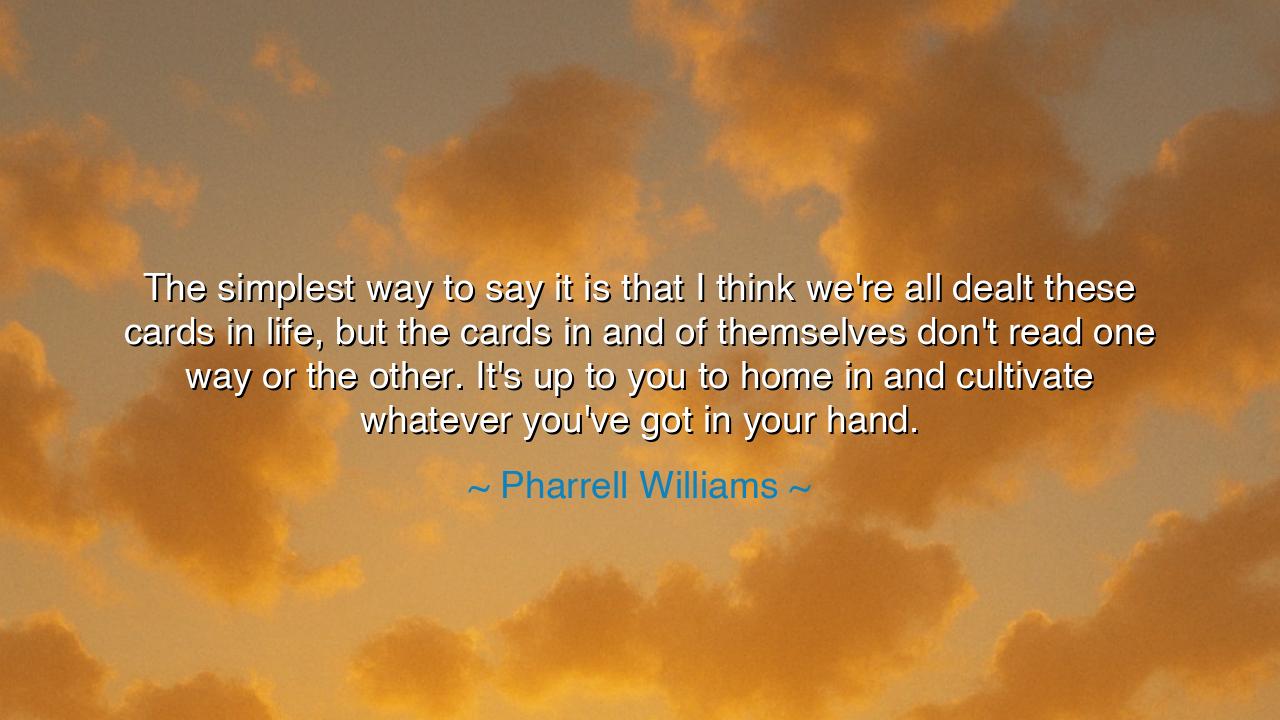
The simplest way to say it is that I think we're all dealt these
The simplest way to say it is that I think we're all dealt these cards in life, but the cards in and of themselves don't read one way or the other. It's up to you to home in and cultivate whatever you've got in your hand.






“The simplest way to say it is that I think we're all dealt these cards in life, but the cards in and of themselves don't read one way or the other. It's up to you to home in and cultivate whatever you've got in your hand.” Thus spoke Pharrell Williams, a creator of rhythm and light, whose art carries both joy and reflection. Beneath the ease of his tone lies a teaching as ancient as fate itself: that destiny is not what is given, but what is made. The cards we are dealt—our circumstances, our talents, our trials—do not dictate our story. It is what we do with them, how we play them, that shapes the measure of our lives. In this modern parable, Pharrell calls us not to complaint or comparison, but to mastery, to the noble work of turning limitation into possibility.
From the dawn of time, humankind has wrestled with the mystery of fate. The Greeks called it moira, the thread woven by the gods; the Chinese spoke of the Mandate of Heaven; in every culture, the question was the same: do we command our destiny, or are we prisoners of it? Pharrell, in his wisdom, gives the modern answer: both. Life deals the hand—we cannot choose our birth, our hardships, our gifts—but the game is ours to play. The cards themselves are neutral, neither blessed nor cursed. It is the spirit of the player—the will to learn, to adapt, to grow—that transforms chance into destiny.
The imagery of the cards is no accident. In every game, luck and skill entwine, just as they do in life. Two players may hold the same hand, yet one will triumph while the other falters. Why? Because one studies, one strategizes, one dares to believe that even a weak hand can be played with brilliance. So it is with the human soul. Many lament what they lack—fortune, beauty, wealth—while others cultivate what they have until it shines. The farmer who tends poor soil may harvest abundance through patience; the artist who lacks grand tools may create masterpieces with simplicity. In truth, greatness is not bestowed—it is crafted through attention and courage.
History, too, bears witness to this truth. Consider Helen Keller, born blind and deaf, her world shrouded in darkness and silence. The cards in her hand seemed cruel beyond measure. Yet she refused despair. With the guidance of her teacher Anne Sullivan, she cultivated her gifts—her mind, her will, her empathy—until she became a voice for millions, a symbol of human triumph. The cards did not change; her spirit did. Like a master player, she saw beyond limitation and made of her life a testament to the power of cultivation.
Pharrell’s teaching also carries a gentler wisdom—that no hand is to be envied or despised. The glittering hand may bring its own burdens; the humble one, its quiet blessings. The cards “don’t read one way or the other” because meaning is born only when we engage with them. The rich may be poor in peace, and the obscure may glow with purpose. The one who cultivates, who takes the raw material of life and refines it with gratitude, gains the only true victory: mastery of the self. For the one who plays his cards with wisdom finds that even loss becomes lesson, and failure becomes seed.
In Pharrell’s words is also the spirit of the artist—one who creates not from perfection, but from imperfection shaped into beauty. Every song he writes, every rhythm he crafts, begins as a handful of sounds, scattered like cards upon a table. It is through cultivation, through patient listening and shaping, that chaos becomes harmony. So too must each of us become artists of our own lives, taking what is ordinary and making it radiant. The raw hand life gives us is not the end—it is the beginning of a composition whose melody is written by our choices.
Therefore, my children of the present age, take heed of this truth: stop wishing for a different hand, and start mastering the one you hold. Study it. Refine it. Find in it the hidden advantage, the quiet strength, the unexpected grace. Life will not always be fair, but it will always be fertile for those who plant. The cards of your fate are not meant to define you—they are meant to challenge you to become greater than circumstance. For the wise do not ask for better cards—they ask for better play.
And so, let this teaching of Pharrell Williams endure: Cultivate what you have. Turn your pain into patience, your weakness into wisdom, your gift into greatness. The world is filled with those who complain about their luck; few are those who transform it. Be among the few. For when your hand is played with courage, attention, and love, the cards themselves—those same indifferent pieces of chance—will one day sing of your mastery.






AAdministratorAdministrator
Welcome, honored guests. Please leave a comment, we will respond soon